Mexico's next president will be a woman after historic election, but will she be a feminist?
There is little doubt that on Sunday, Mexico will elect a woman to be president for the first time in its history. But it will come after a campaign where the two leading candidates, Claudia Sheinbaum and Xóchitl Gálvez, did not distinguish themselves with a feminist-friendly agenda.
Some women in Mexico doubt that this historic moment will represent a breakthrough for their rights, such as pay equity, being able to make decisions about their bodies and living in a society where violence against women is punished.
In the sweltering heat of Mexico City, Katrina Castro, 38, welcomed CBC News to her modest two-bedroom apartment in the Moderna district, in the heart of the capital.
Using a napkin as a fan, the university professor and mother of one is visibly tired from the heat wave that has hit the country and from the months-long election campaign — along with the fact that none of the two main candidates has put forward much of a feminist platform.
"I would have hoped they had more sensibility" toward women's demands for greater rights, Castro said.
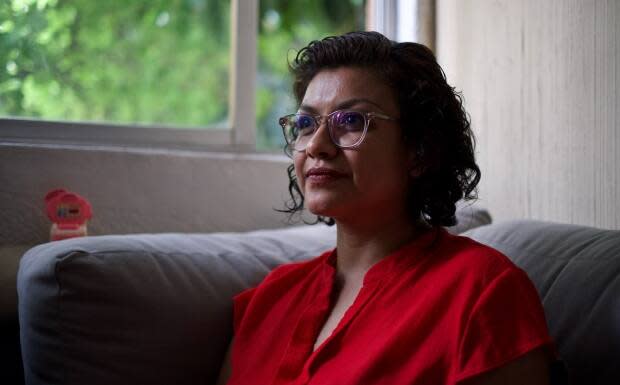
"There were meetings with senior citizens, students, but neither of [the female candidates] met with women. It's true that they can't meet with all of them, but they could at least have met with academics, politicians, where they could have had a dialogue."
Three kilometres west, in the Roma Norte neighbourhood, a local vendor at the Medellin Market said she also has doubts about the two leading candidates.
"We need people who can change things. Their promise [regarding women's rights] is only to bring votes. But no, neither of them is a good candidate. And they are not going to change anything. Everything will remain the same," said Maria Teresa, 60, a florist.
In her opinion, both candidates, even if they're women, are products of a political system that failed women in the past and are more interested in the economy than the Mexican people.
Candidates talk but provide few solutions
The campaign did not lack promises, but they seemed too general to offer any real change.
This left many feminists who spoke to CBC News with the impression that the movement and earlier struggles for greater representation of women in Mexican politics have been used by the two leading candidates to advance their campaigns for the presidency without actually committing to real change for women.
Claudia Sheinbaum, a former mayor of Mexico City and the candidate for the leftist alliance Sigamos Haciendo Historia, or "Let's Keep Making History" (made up of the ruling party Morena, the Labor Party and the Greens), has repeatedly spoken of a "Mexico for women." She also wants to ensure that every violent death of a woman is investigated as a femicide.
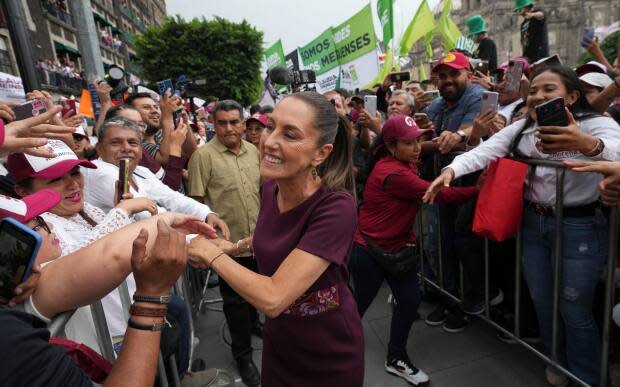
But her strained relationship with some feminist groups — with whom she had broken off dialogue when she was mayor of Mexico City from 2018-23 — returned during the campaign. Feminist organizations like Intersecta and Equis hope things will change if she's elected president.
Sheinbaum, a protégé of outgoing President Andrés Manuel López Obrador who promoted herself as guaranteeing continuity, quickly pushed women's rights off the agenda in favour of other priorities, despite talking about them in her speeches.
The president's own popularity has helped Sheinbaum in the polls. A few days before the election, she was still in the lead, by just over 20 per cent, over her main competitor, according to the latest data aggregated by AS/COA, two U.S.-based think-tanks interested in Latin American politics.
Sheinbaum's main competition, Xóchitl Gálvez, is a former senator and businesswoman who represents the opposition alliance from the centre-left to the conservatives (PRI, PAN, PRD). She has also been known to put forward feminist themes in her speeches but without offering any concrete solutions.
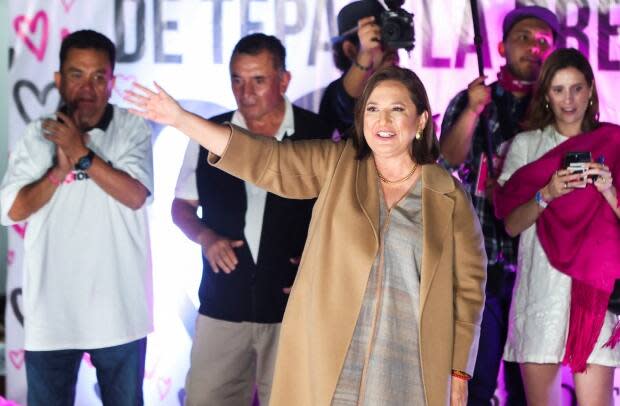
Of Otomi origin, an Indigenous people of Mexico, Gálvez has often said that she can understand violence against women because she was a victim of it as a young child. This recognition of the intersectionality of the issues facing the country's Indigenous women could have been a breath of fresh air had it been accompanied by concrete measures rather than a simple mention of zero tolerance.
Moreover, neither Sheinbaum nor Gálvez made any substantive proposals on the subject of abortion, deferring only to the Mexico Supreme Court's decision of Sept. 6, 2023, decriminalizing abortion at the federal level.
Security: A defining theme for women
But when it comes to security — a topic that could have sparked a real debate of ideas and brought a feminist perspective — the two leading candidates were divided.
A recurrent theme in Mexican politics, it was once again brought to the fore in this election campaign by the violence deployed against many of the candidates. According to the Laboratorio Electoral, which compiles data, 82 people, including 34 candidates, have been assassinated in this electoral cycle, and 272 cases of threats, attacks or kidnappings have been recorded.
The National Institute of Statistics and Geography estimates that there are more than 15,000 homicides a year, but other experts put the number at about 30,000 a year. The country sees an average of 10 femicides per day, according to the government.

But perhaps there is no better example of how distant the two candidates seem from the issues important to women than how they dealt with the tens of thousands of "Seeking Mothers" who are looking for the more than 110,000 children who disappeared — most likely kidnapped, including by drug cartels and other criminals — over the past several decades.
There was hope that the two candidates, mothers themselves, would have listened more to the mothers' suggestions regarding insecurity in the country, including prevention and reopening cases of the disappeared.
But neither of them met with the collective. Only Gálvez mentioned the mothers directly in her campaign platform, saying she wanted to help them without explaining how.
"If Sheinbaum would have wanted to make a change, why didn't she do it when she was mayor?" asked Jaky Palmeros, 41, whose 21-year-old daughter went missing in a grey car on July 24, 2020, while Sheinbaum was in office.
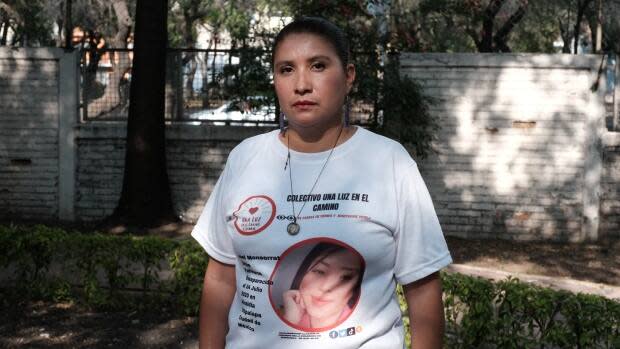
"As for Xóchitl Gálvez, we have no guarantee that she will adopt a new strategy regarding the missing children in the country. During the campaign, she never talked about it. So we do not have any certainty that [having a woman as president] will change anything," she said before leaving the Parque Lineal Ramos Millan, in the Iztacalco sector of Mexico City.
Palmeros, like thousands of other mothers, will put her daughter's name on the ballot instead of voting for one of the candidates.
'It wasn't the election we'd hoped for'
Intersecta and Equis, two feminist groups that CBC News met while in Mexico, recognize the importance of having Sheinbaum and Gálvez in a race for the presidency, particularly in a country where they say there is "massive machoist violence." Despite feeling bittersweet about the campaign, the groups say they hope the next president will reopen the dialogue with them.
In her research, however, Tania Islas Weinstein, a Mexican assistant professor of political science at McGill University in Montreal, goes a step further.
"It's interesting how the fact that a woman will be in power seems to be a celebration of feminism when we know that it doesn't mean that because a woman is in power, she is, therefore, a feminist," said Weinstein, who specializes in Latin American political representation.
"You'd think that women might be more open to certain comments surrounding femicide, surrounding gender violence, because they've been victims of it. But being a victim of violence doesn't necessarily mean that you're able to think of your experience as something political, something around which it's possible to organize politically, or even to know what to do to respond to this issue."
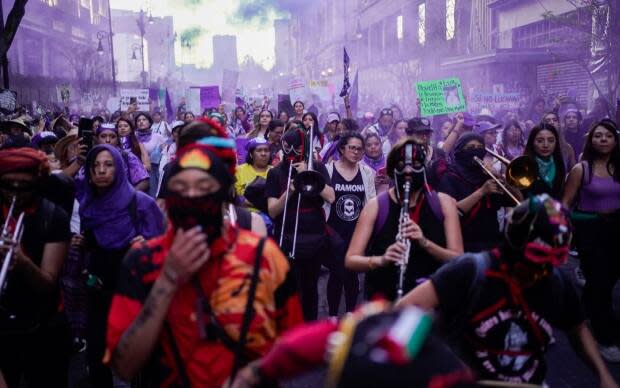
Moreover, Weinstein said, Sheinbaum and Gálvez's silence on solutions to gender violence and women's rights proves that the two candidates are not very close to feminist movements and thinking.
"It wasn't the election we'd hoped for, but that doesn't mean we shouldn't go out and vote," said Katrina Castro, the mother of a two-year-old girl.
Castro said she'll make what she sees as the least bad choice and vote for Gálvez, the only candidate, in her opinion, who hasn't tried to make violence against women invisible — a reference to the last six years during which outgoing president López Obrador and his protégé, Sheinbaum, have questioned certain statistics surrounding gender violence.
"I want to vote for someone who names us, who doesn't deny us, who doesn't make us invisible, who doesn't tell us we don't exist."
WATCH | Chaos in Mexico after stage collapses at political rally:

